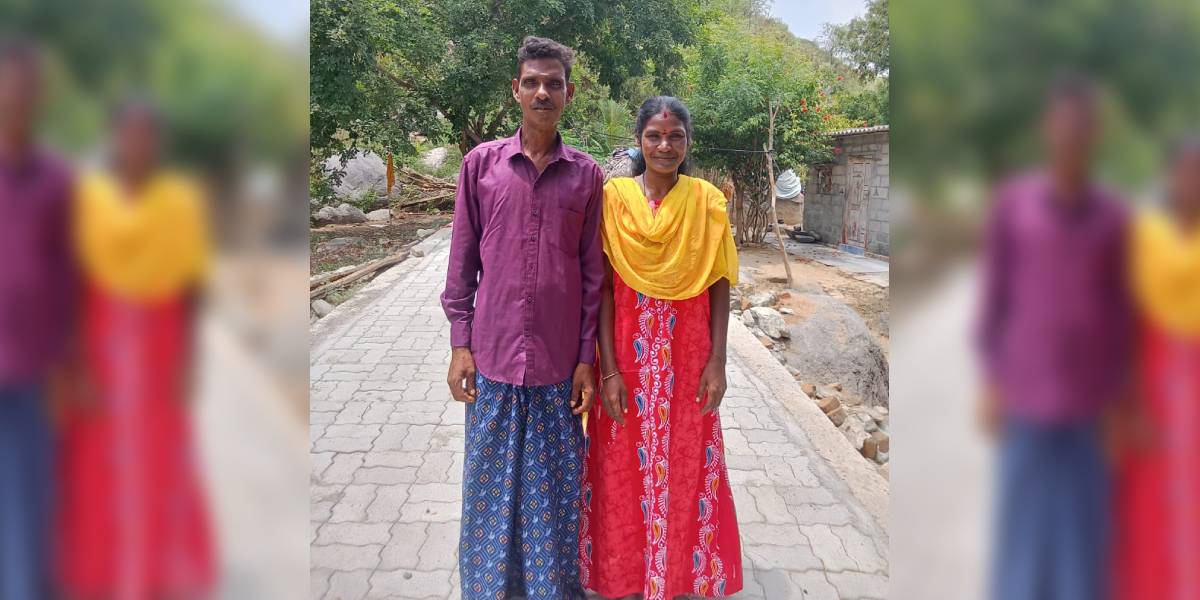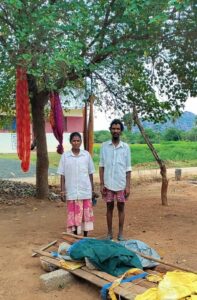Published May 03, 2025 | 9:00 AM ⚊ Updated May 24, 2025 | 7:34 PM

The couple, Masi and Govindammal, spent several years working at a brick kiln, after borrowing Rs 60,000 to fund their daughter's wedding. (Supplied)
Synopsis: Despite a law prohibiting bonded labour, the inhuman practice continues in 21st-century Tamil Nadu. The practice, initially confined to making tribespeople work for less or nothing, has now widened to include Scheduled Castes members. A concerted effort by the government is required to end this social evil.
“It was five — maybe six — Pongals ago,” Govindammal tried to recollect.
Despite her best efforts, she could not remember when she and her husband Masi started working for Kumar at the latter’s brick kiln at Valapady in Salem.
Years of harassment and inhuman treatment that came along with the bonded labour have blurred her memory. Time seldom mattered for the couple as they toiled day and night at the kiln, and tried to stay alive even as the hope of escaping the trap kept fraying.
They had become outsiders to themselves, working robot-like at the Salem kiln, their feelings and sufferings remaining unheard as they baked brick after brick, braving the heat and the abuses showered on them.
Somewhere deep in their minds, they knew it was not right and that they should escape.
Today, the years spent at the kiln, devoid of human necessities, seemed to be a nightmare that jolted them awake midsleep.
The reality of the gained freedom has gradually started sinking in as Masi (54) and Govindammal (46), both school dropouts, sat at their house at the quiet Konai village in Tamil Nadu’s Villupuram, and looked back with a sense of apparent disbelief.
“It began five — maybe six — Pongals ago,” Govindammal narrated her story.

Govindammal and husband Masi. (Supplied)
The story was of her husband Masi, too — and that of many others in Tamil Nadu — a tale penned by poverty, a lack of proper education and awareness, unemployment, migration, never-ending debt, exploitative employers, abuse and inadequate government control.
Parents to four daughters, life was not smooth for the Masi-Govindammal couple as Konai offered little to make both ends meet. Villagers were already migrating to cities, near and far, in search of employment.
Money was short for Masi and Govindammal. They hoped for a better life for their daughters and married them off to men who promised to take their brides far from the village and poverty.
It was one of the four marriages that upended the couple’s lives. Unable to raise money for the marriage expenses, they heeded a few neighbours’ words that a kiln at Salem would make an advance payment, which could be repaid later with labour.
The couple met brick kiln owner Kumar, who granted them a loan of ₹60,000 on the condition that the Masi and Govindammal would work for him. The couple agreed without much thought. For them, their daughter’s marriage was then the priority.
“He (Kumar) said we could repay the loan by working for him. No terms and conditions, no papers,” Masi said. “We thought it was just work. What could go wrong?”
Life itself went awry after they accepted the money.
Little did the couple know that the decision to accept Kumar’s offer would strip them of their happiness and dignity for the next five or six Pongals, the annual harvest festival in Tamil Nadu.
The labour at Kumar’s brick kiln was beyond the couple’s worst fears. Indentured labour was not something they had heard back in their village. They experienced it for the first time.
Masi and Govindammal said they worked close to 20 hours daily, without a break, and produced 2,000 – 3,000 bricks a week. Together they earned ₹1,000 every week.
Masi said the amount varied according to the number of bricks produced. In some weeks, they received just ₹800. Angry screams silenced their questions. “He (Kumar) used filthy language, threatened to beat us, and said no one would come if we cried for help,” he recalled.
He narrated their routine at the kiln. “We’d begin at 10 pm and make bricks till 10 am,” Masi said. “After a small meal, we’d be soaking and kneading clay until 6 in the evening. Then, after just a few hours’ sleep, we start again.”
The routine blurred their memory as they lost a sense of time, for it seldom mattered to them. “We don’t even know when we went there,” Govindammal joined the conversation. “Five — maybe six — Pongals ago,” she added, after a pensive pause. Masi remained silent.
Basic amenities were alien to the couple at the kiln — so were clean drinking water, toilets, or electricity. The food was often stale and unfit for human consumption. “We ate spoiled rice every day,” Govindammal said, her voice shaking.
In early 2025, they found a brief window to escape. Using a village temple festival as an excuse, they returned to Konai for a short break and decided not to return. But while Masi was away attending a relative’s wedding, Kumar visited the village and took Govindammal back.
“He abused me horribly and dragged me back to the kiln,” she said. “His wife tried to beat me, too. They told me I would die there, and no one would come to my rescue.”
Govindammal was forced to work alone for five days under threats and humiliation. But a sliver of hope arrived when a young relative urged Masi to attend a legal aid camp conducted by the District Legal Services Authority (DLSA) in their village.
For once, Masi lodged an official complaint. The DLSA acted swiftly, rescued Govindammal and initiated action against Kumar.
Now free, the couple is back in Konai, finally able to rest and breathe easy. “We feel safe for the first time in years,” they said.
DLSA is a legal aid mechanism functioning under the broader framework of the National Legal Services Authority (NALSA), operating in a structured, hierarchical manner, from the national to the state, district, and even zonal levels.
In each district, the District Judge heads the authority, with the Senior Civil Judge as its secretary. A team of advocates and volunteers carry out the actual legal outreach.
Speaking to South First, V Ajay, a Para Legal Volunteer (PLV) of the Villupuram unit, explained that the core mission of the DLSA is to provide free legal assistance to the poor, voiceless, and marginalised.
“We conduct outreach camps in remote areas, meet people directly, listen to their issues, and ensure they are informed of their legal rights and protections,” he said.
It was one such legal aid camp that freed Masi and Govindammal from years of bondage and helped them reclaim freedom and dignity.
Ajay said Masi complained directly to District Senior Judge and DLSA Chairperson R Poornima, who forwarded the complaint to the Superintendent of Police. The police intervened and ensured Govindammal’s freedom from the brick kiln.
Bonded labourers have long been rescued across Tamil Nadu. Most often, those affected by this exploitative system belong to Scheduled Castes and indigenous tribal communities.

R Murugappan, State Coordinator of the Social Awareness Society for Youths. (Supplied)
South First spoke to R Murugappan, the State Coordinator of the Social Awareness Society for Youths (SASY), an organisation actively involved in rescuing bonded labourers.
“Bonded labour involves practices such as paying extremely low wages or no wages at all, or coercing someone to work in exchange for an advance payment. These workers are then forced to stay and work under those terms,” Murugappan explained the system.
Earlier, it was mostly tribespeople, such as the Irulas, who were pushed into bonded labour.
“But now, we see a growing trend where more people from Scheduled Castes are also being drawn into such labour systems. For example, we have observed that women from areas like Chinnasalem in Kallakurichi are increasingly being taken to Bengaluru for domestic work,” he said.
Masi and Govindhammal belong to the Irula community in the Villupuram district.
Murugappan added that bonded labour among tribal communities continues in industries like brick kilns. He also pointed out that the system persists in garment factories in Tirupur, sugarcane fields of Andhra Pradesh, and plantation work.
“It underscores the widespread and evolving nature of bonded labour,” the activist added.
Chief Minister MK Stalin recently announced that Tamil Nadu would aim to become a “bonded labour-free state” by 2030. Moreover, the state has declared 9 February as “Bonded Labour System Abolition Day,” the first in India to do so.
But are these measures sufficient to eradicate bonded labour? Murugappan remained sceptical. He felt the ongoing efforts were inadequate.
“The responsibility of rescuing bonded labourers lies with the district Revenue Department, specifically the RDO – Sub-Collector. But most officials are unaware that this is even part of their duty. Even if they don’t go out to the field and rescue people, they can at least investigate complaints. But many don’t, either due to ignorance or apathy,” he said.
Murugappan explained how disputes such as wage issues or workers being denied leave to attend village festivals often end up as complaints at local police stations. Yet, these are rarely recognised or handled as bonded labour cases.
“This shows how poorly equipped our system is,” he said.
In many instances, NGOs like People’s Watch have to step in to resolve such cases. What is most concerning, he said, is the complete lack of awareness among officials about their responsibility to implement the law.
“The government may claim to conduct awareness camps, but what exactly is being taught there remains a big question,” Murugappan said.
“Even after the labourers are rescued, proper rehabilitation is not provided by the government,” he added.
However, Labour Minister CV Ganesan recently told the media that over the past four years, enforcement officers carried out 34,335 inspections, rescuing and rehabilitating 60 child labourers, 283 adolescents, and 120 bonded labourers.
The Bonded Labour System (Abolition) Act, 1976, was enacted in India to eliminate forced labour systems where individuals are coerced to work under exploitative conditions, often to repay debts. The law abolished the bonded labour system and released all individuals from any such obligations.
It nullified all bonded debts and prohibited creditors from recovering them by force or legal means. Any agreements or traditions requiring a person or their family to serve as bonded labourers cannot be legally enforced.
The Act also mandated the restoration of seized property and assets and the rehabilitation of rescued individuals. Violations, including coercing someone into bonded labour, have been made criminal offences, punishable by fines and imprisonment.
The Act reinforced Article 23 of the Indian Constitution, which prohibited forced labour and supported the protection of human dignity and freedom.
However, Murugappan pointed out that the legal provisions are rarely implemented. “In most cases, neither the Bonded Labour Act nor the SC/ST Prevention of Atrocities Act is effectively enforced. I have never seen an employer prosecuted and punished for indulging in bonded labour,” he said.
While the law mandated issuance of release certificates and immediate relief payments to rescued bonded labourers, such as the ₹20,000 relief amount, it has been granted in only a few cases. Legal action against the employers, Murugappan said, is almost unheard of.
“Under the SC/ST Act, an FIR must be filed immediately, and the accused arrested. But this is seldom done,” he claimed.
Murugappan called for greater awareness about these two laws (Bonded Labour Act and SC/ST Act) among both the public and officials. He also recommended a toll-free helpline for bonded labourers, similar to helplines available for women and children.
“This would allow workers to directly reach government officials and seek help, instead of having to rely on NGOs,” he said.
“People with permanent housing are less likely to end up in bonded labour. For example, among Dalits and Irulas, it is mostly Irulas who fall into bondage. This is because they lack permanent housing and are constantly migrating in search of a livelihood. This makes them vulnerable to exploitation,” he pointed out.
If the government can ensure housing for Irula families, Murugappan said, they would begin building their lives around those homes, educate their children, and earn at least ₹150 a day to sustain a decent life.
“Eventually, their vulnerability to bonded labour will reduce significantly,” he opined.
Murugappan also raised concerns about what he called a modern form of bonded labour emerging under the Tamil Nadu government’s employment practices.
Today, 75% of sanitation workers employed under the Tamil Nadu government are not direct employees, they are contract workers.
“The government signs contracts with private agencies, which in turn hire sanitation workers and pay them far less. The government just pays the agency, and that’s the end of it,” he said.
“This is a new form of bonded labour,” Murugappan argued. “The government has no data on these workers, their wages, benefits, or working conditions. All they care about is paying the contractor and getting the job done.”
These private companies, after receiving government funds, pay only a fraction of it to the workers. This system, he said, mirrors the exploitative nature of traditional bonded labour.
The solution? “The government must stop outsourcing sanitation work and directly employ these workers with fair pay and benefits,” Murugappan demanded.
(Edited by Majnu Babu).

